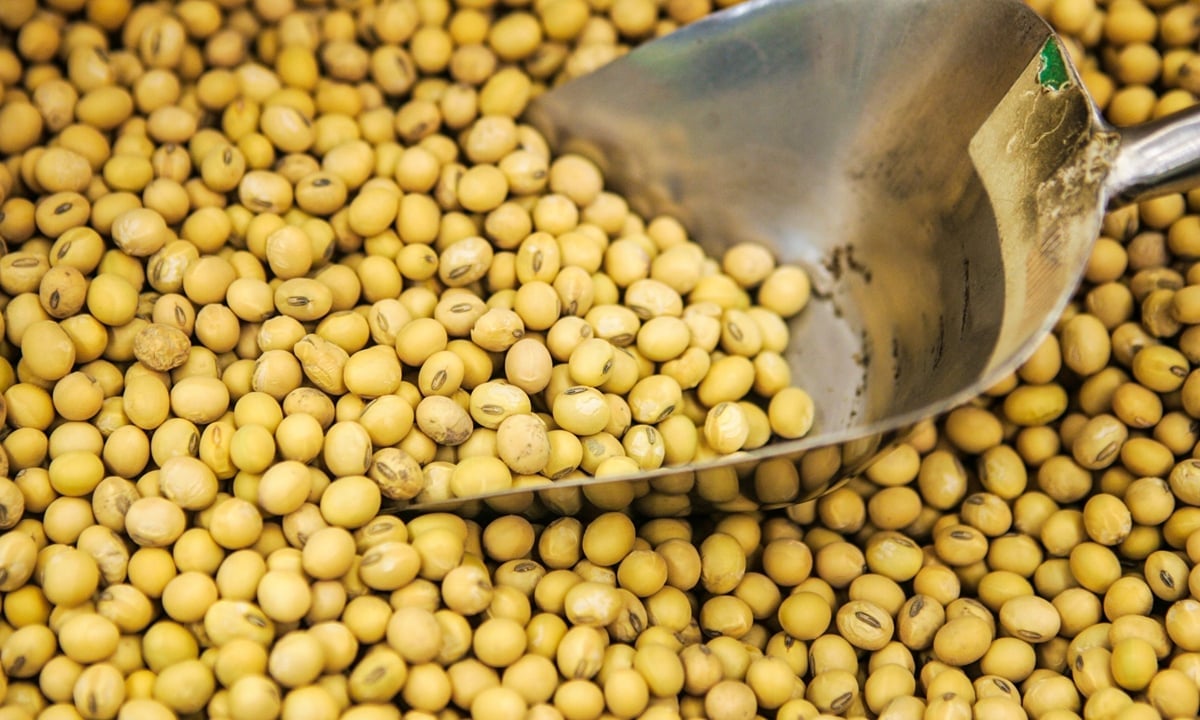December 4, 2025 | 22:40 GMT +7
December 4, 2025 | 22:40 GMT +7
Hotline: 0913.378.918
December 4, 2025 | 22:40 GMT +7
Hotline: 0913.378.918

Soybean. Photo: VCG.
In April, around 40 Brazilian soybean ships are expected to dock at Zhoushan port, Ningbo, East China's Zhejiang Province, a 48 percent year-on-year increase from the 27 shipments recorded in April last year, Yuyuantantian, a social media account affiliated with China Media Group, reported on Monday.
The report citing source said multiple Brazilian soybean vessels have been docking daily at the Laotangshan terminal of Ningbo Zhoushan port in recent days, projecting that the port will unload 700,000 tons of Brazilian soybeans this April, up 32 percent from last year's 530,000 tons.
This is the most direct manifestation of how the tariff confrontation provoked by the U.S. is harming its key industries and ordinary citizens, and it also demonstrates that most of the products China imports from the US can be sufficiently substituted by sourcing from other countries across the globe, a Chinese expert said.
Data from the U.S. Department of Agriculture (USDA) showed that exports of American agricultural products, including soybeans and pork, have been declining sharply. For the period of April 11-17, 2025, this was the first full week of reporting after the U.S.-provoked tariff escalation with China.
Net sales of U.S. soybeans dropped by 50 percent compared to the previous week, while net pork sales plummeted by 72 percent at the same period, per a release the Global Times read at department's official website.
China has reduced its purchases of U.S. soybeans and scaled back the amount of pork it plans to import from the US in 2025. China purchased only 1,800 tons of soybeans in the period, a far cry from the 72,800 tons it purchased in the week ended April 10, the Wall Street Journal (WSJ) reported, citing USDA data on April 24.
USDA data also showed a 12,000-ton reduction in previously announced purchases of U.S. pork by China, cutting total sales for the week ended April 17 to a mere 5,800 tons. That is the lowest figure for 2025 delivery reported so far this year, and it is 72 percent lower than the prior week, the WSJ report said.
It is evident that the U.S. agricultural sector is already suffering from the tariffs, as products like soybeans and pork heavily rely on the Chinese market, Li Yong, a senior research fellow at the China Association of International Trade, told the Global Times on Monday.
"China's vast market and strong purchasing power mean that tariffs have disrupted previously established trade relationships," Li noted.
By instigating a tariff war, the U.S. is voluntarily excluding itself from China's enormous market, according to Li, adding "Despite being a highly competitive supplier in the global market, the tariffs have forced American farmers to lose market share to competitors."
The WSJ cited analysts' predictions that prices for agricultural commodities could come under sharp pressure if this trend continues.Since January, the U.S. has repeatedly imposed tariffs on Chinese goods, deliberately sparking a new round of trade disputes. In response, China swiftly implemented countermeasures. Starting March 10, China imposed a 15 percent tariff on U.S.-origin chicken, wheat, corn, and cotton, and a 10 percent tariff on sorghum, soybeans, pork, beef, seafood, fruits, vegetables, and dairy products.
Li predicts that the US tariffs will lead China to shift toward purchasing more agricultural products from other countries, reducing the US share in the Chinese market.
China has been actively diversifying its agricultural imports in recent years, with Brazil surpassing the US to become its top supplier of soybeans, CCTV reported earlier. Market data revealed that between 2016 and 2024, the US share of China's soybean imports declined from 40 percent to just 18 percent, according to the report.
Industry data showed that China imported 416,000 tons of pork from the US, accounting for 18 percent of its total pork imports last year. In 2024, China was the third-largest pork market for the US, while the US was China's third-largest meat supplier, following Brazil and Argentina.
"Whether for soybeans, pork, or beef, China can find ample substitutes from other agricultural exporters such as Brazil, Argentina, and Australia, whose trade policies are more open than those of the US," Li noted, emphasizing that US tariffs will likely accelerate trade diversion, further strengthening China's cooperation with these countries.
Li urged the US government should recognize the consequences of its tariffs. "Only by lifting all unilateral tariffs can it truly address the challenges faced by its affected industries," Li noted, stressing that protectionism will not achieve the US government's intended goals.
Global Times

(VAN) As of 2025, the ASEAN region has a total of 69 ASEAN Heritage Parks recognized across its 10 member states. Among them, Viet Nam contributes 15 ASEAN Heritage Parks.

(VAN) Yok Don National Park has high biodiversity with numerous endemic plant and animal species, and it is also the only dipterocarp forest ecosystem conservation area in Viet Nam.

(VAN) Viet Nam and Brunei signed two important MOUs on fisheries and IUU, expanding cooperation in agriculture, the environment, and Halal exports, aiming to substantively implement joint projects.

(VAN) The Viet Nam Coconut Association worked with the International Finance Corporation (IFC) and businesses to promote the supply chain, enhance competitiveness, and develop the coconut industry sustainably.
![Hue aims for Net Zero: [2] Pioneering low-emission tourism](https://t.ex-cdn.com/nongnghiepmoitruong.vn/608w/files/huytd/2025/12/04/0633-dulichzero-4-095634_236-161125.jpg)
(VAN) The ancient capital of Hue has developed Net Zero tourism products and models, aiming to reduce carbon emissions and pioneer the establishment of Viet Nam's green tourism destination.

(VAN) C.P. Viet Nam has announced the successful completion of its goal to plant 1.5 million trees during the 2021-2025 period, a key milestone within company's long-term ESG strategy and its roadmap for emission reduction.

(VAN) This is an initiative of MAE aimed at creating a unified coordination mechanism to implement agricultural cooperation programs with developing countries.